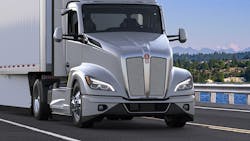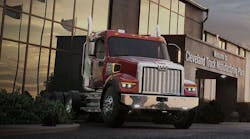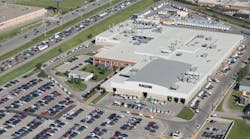Bonus depreciation in 'One Big Beautiful Bill' adds optimism to Paccar orders
Key takeaways:
- Tax incentives are driving fleets to invest in new trucks by restoring full deduction rights for equipment.
- Paccar anticipates a drop in truck deliveries in Q3 and has lowered its full-year Class 8 sales forecast to 230,000-260,000.
- Paccar remains optimistic about future orders and expects cash benefits of $300 million to $400 million from the provisions of the OBBBA.
Provisions in the recently passed One Big Beautiful Bill Act that accelerate capital investment depreciation are already spurring fleets to step up talks about buying new trucks, Paccar CEO Preston Feight told analysts and investors on July 22.
“It does have benefits to their cash,” Feight said about customers’ plans during a conference call to discuss the second-quarter results of the parent of the Peterbilt and Kenworth truck brands. “Their ability to deploy that cash or capital asset purchases like trucks is starting to be part of the conversation and is part of our optimism for the latter part of the year.”
As part of the wide-ranging recent tax and spending bill, lawmakers in Washington voted to restore the ability for businesses to fully deduct from their taxes the cost of equipment and machinery in the year that equipment is placed into service. Without the bill, the so-called bonus depreciation rates enacted by the Tax Cuts and Jobs Act of 2017 would have dropped to 40% this year before stepping down to zero by 2027.
In the short term, things will be relatively rough for Bellevue, Washington-based Paccar: The company delivered 39,300 trucks globally in the three months that ended June 30, but Feight and his team expect that number to drop to between 32,000 and 33,000 this quarter. They’ve also trimmed their full-year forecast for Class 8 sales in the U.S. and Canada to between 230,000 and 260,000, 2% below their May forecast and 7.5% less than their expectations from January.
Feight said the company’s third-quarter margins are difficult to forecast as tariffs are weighing more heavily than in the spring but added that they’re likely to come in around 13% and be a cyclical low. But, in addition to a lift from the One Big Beautiful Bill Act, he said he’s optimistic about orders picking up from here, both because the freight market continues to work off overcapacity and there’s the likelihood that there will be some clarity soon on tariffs as well as 2027 emissions regulations.
“If we get confidence and certainty around tariff structures in the third quarter, then I think customers’ reactions to that will be positive,” Feight said.
Paccar’s finances also stand to benefit directly from the OBBBA’s depreciation provisions, which also apply to research and development spending. CFO Brice Poplawski told analysts the company should see a cash benefit of between $300 million and $400 million.
Feight’s optimism about orders building later this year and into 2026 echoes statements made last week by Volvo Group’s Martin Lundstedt about supply and demand being “in good balance.” Similarly, ACT Research Vice President Steve Tam told FleetOwner this week that new-truck sales are likely to be flat next year after a 2025 in which fleets are adding far fewer trucks to their fleets.
Paccar posted a net profit of $724 million in the second quarter, which was a steep drop from more than $1.1 billion in the same period of last year. Net revenues fell to nearly $7.0 billion from more than $8.2 billion a year earlier, when deliveries were nearly 20% higher.
Shares of Paccar (Ticker: PCAR) popped more than 6% to $98.58 on the back of the earnings report and conference call. Over the past six months, however, they are still down about 10%, a drop that has trimmed the company’s market capitalization to $49 billion.
About the Author
Geert De Lombaerde
Senior Editor
A native of Belgium, Geert De Lombaerde has more than two decades of experience in business journalism. Since 2021, he has written about markets and economic trends for Endeavor Business Media publications FleetOwner, Healthcare Innovation, IndustryWeek, Oil & Gas Journal, and T&D World.
With a degree in journalism from the University of Missouri, he began his reporting career at the Business Courier in Cincinnati. He later was managing editor and editor of the Nashville Business Journal. Most recently, he oversaw the online and print products of the Nashville Post and reported primarily on Middle Tennessee’s finance sector and many of its publicly traded companies.




